七下unit11how_was_your_school_trip_Section_B2 ppt课件
2013_版____Unit_11-_How_was_your_school_trip-Section_B_2a-2c
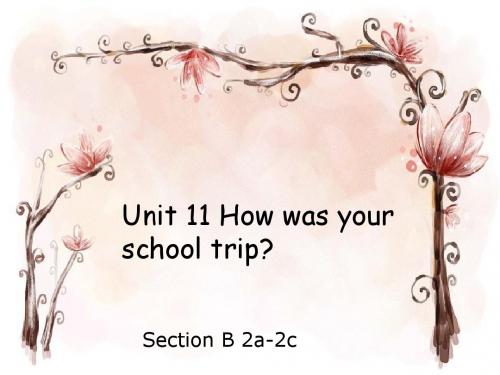
Helen
the trip the train
Jim
exciting
fast
terrible
slow
the museum really interesting big, boring, the gift shop and gifts
dark, too many people
lovely, not expensive
positive [ˈp ɒzətɪv]
attitude
adj. 积极的,肯定的;
[ˈætitju:d] n. 态度,看法;
1. What did Helen visit on the school trip? 2. How did Helen feel about the school trip? 3. How did Helen get to the science museum? 4. What did Helen see along the way?
Read Helen’s diary and answer the following questions.
5. What did Helen learn at the museum?
6. What could robots do with visitors?
7. What did the guide teach them?
8. Did Helen take many photos? 9. What did Helen buy at the gift shop? 10. Who did Helen buy the gifts for?
11. Were the gifts expensive?
June 15th
Unit11How+was+your+school+trip+课件22-23学年人教版英语七年级下册

so expensive
Underline (划线) the phrases and the sentences
1.参加学校郊游
go on a school trip
2.沿途
along the way
3.教我们怎么制作机器人 teach us how to make robots
answer the questions.
1. Did Helen and Jim go on the same trip? Yes, they did. They went on the same trip.
2. How do they feel about the trip? Helen thought the trip was really interesting and exciting, but Jim didn’t like the trip at all.
go to the countryside great
A: __H_o_w__w_a_s__ your school trip? B: It was great. A: _W__h_a_t_d_i_d__ you do? B: We went to the countryside.
We had a really good time!
1.Where did Helen go on June 15th? She went to the science museum. 2.How did she go there? She went there By train. 3.Did she learn anything at the science museum? Yes, she did. She learned a lot about robots. 4.What did the guide teach Helen to do? The guide taught her how to make a model robot. 5.Did she take any photos? Yes, she did. She took a lot of great photos. 6.What did she buy for her parents? She bought some lovely gifts for her parents.
初中英语 七年级下册 Unit11How was your school trip

the trip the train
the museum
the gift shop and gifts
Helen
exciting fast
really interesting
lovely, not expensive
Jim terrible slow
big, boring, dark, too many people
2. Learn about Helen’s and Jim’s diary entries. 3. Learn to write diaries with past tense.
Lead-in
Look at the pictures and talk —I +v-ed(went to …)/ —It/That sounds…
The museum was big and boring. Everything was
about robots and I’m not interested in that.
be interested in… 对……感兴趣
hear v. 听到;听见。 用法:hear sb. do sth. 听到某人做 某事(全过程)hear sb. doing sth. 听到某人正在做某事
✓ 特殊疑问词+不定式结构可改写成由该疑问词 引导的宾语从句,改写时在疑问词后加主语 (与主句主语一致),将不定式改成“should+ 动词原形”作谓语。
You have to consider what to do next. =You have to consider what you should do next.
总的来说,相当于in a word或in short.
Unit_11_How_was_your_school_trip_Section_A_2

I. 填入适当的词。 1. She often ____ (go) to the park on goes weekends, but yesterday she went (go) to ____ the zoo. 2. Last week she had (have) fun on a farm. ___ 3. What ___ they __ (do) on the school trip? did do They ____ (ride) horses and _______ rode climbed (climb) the mountains.
3. I was very busy last week. (改否定
句和一般疑问句)
I wasn’t very busy last week. ______ _____ Were you very busy last week? 4. There was some orange in the cup. (变一般疑问句) _____ there ____ orange in the cup? any Was
was 4. How ____ their school trip? It was interesting. ___
___ she go (go) fishing? __ Did Yes, she did. 5. Did Li Ming ____ (pick) any ___ pick
strawberries? No, he didn’t.
Groupwork
Make a survey. Ask your partners what they did last week. Then give a reporter. A: Hi, Carol. What did you do last weekend? B: I watched TV, and then I went fishing with my father. A: How was your last weekend? B: It was boring.
七年级英语下册人教版unit11_How_was_your_school_trip_Section_A1

see ---saw
Did they pick any strawberries on the farm? Yes, they did. They picked strawberries.
pick ---picked Were the strawberries good? Yes, they were. No, they weren’t.
Peter: Oh, nice. What did you do?
Pairwork
Eric: I went fishing every day. And I fed the chickens with my grandpa. It was so much fun.
Peter: Sounds good .How was the weather there?
climbed the mountains (climb)
took some photos (take)
(is) --How was your last school trip ?
--It was ... (is)
(Are) -- Were you happy on your last school trip?
Did he play soccer yesterday?
3. 实义动词的变化: 实义动词分规则变化和不规则变化。 规则变化有以下几种: (1) 一般情况下在动词后加-ed。 e.g. play—played visit—visited walk—walked clean—cleaned
(2) 以不发音的e结尾的词,在词尾 加-d。 e.g. note—noted like—liked dance—danced name—named
新目标版英语七年级下册Unit11Howwasyourschooltrip?(SectionA)含答案
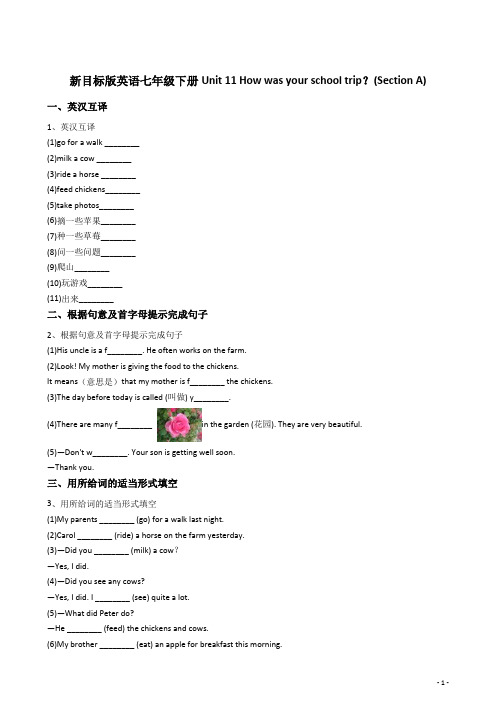
新目标版英语七年级下册Unit 11 How was your school trip?(Section A)一、英汉互译1、英汉互译(1)go for a walk ________(2)milk a cow ________(3)ride a horse ________(4)feed chickens________(5)take photos________(6)摘一些苹果________(7)种一些草莓________(8)问一些问题________(9)爬山________(10)玩游戏________(11)出来________二、根据句意及首字母提示完成句子2、根据句意及首字母提示完成句子(1)His uncle is a f________. He often works on the farm.(2)Look! My mother is giving the food to the chickens.It means(意思是)that my mother is f________ the chickens.(3)The day before today is called (叫做) y________.(4)There are many f________ in the garden (花园). They are very beautiful.(5)—Don't w________. Your son is getting well soon.—Thank you.三、用所给词的适当形式填空3、用所给词的适当形式填空(1)My parents ________ (go) for a walk last night.(2)Carol ________ (ride) a horse on the farm yesterday.(3)—Did you ________ (milk) a cow?—Yes, I did.(4)—Did you see any cows?—Yes, I did. I ________ (see) quite a lot.(5)—What did Peter do?—He ________ (feed) the chickens and cows.(6)My brother ________ (eat) an apple for breakfast this morning.(7)John ________ (study) English last Friday.(8)There ________ (be) two books on the table five minutes ago (以前).(9)They ________ (play) basketball yesterday afternoon.(10)The man ________ (stop) his car and ________ (buy) some strawberries yesterday morning.四、单选题4、It ___________ sunny yesterday. It ___________ rainy today.A、is; isB、is, wasC、was, isD、was; was5、—Jack, is there ___________ in today's newspaper?—No, nothing.A、anything importantB、something importantC、important anythingD、important something6、Yesterday my father ___________ his friends ___________ Tian'anmen Square (天安门广场).A、shows; aboutB、shows, aroundC、showed; aboutD、showed; around7、Could you say it again? I can't understand ___________ you are talking about.A、howB、whenC、whatD、which8、—___________ he go to Central Park?—Yes, he did.A、DidB、DoC、DoesD、Is9、It ___________ last week that the haze(雾霾) in Beijing caused many problems.A、reportsB、reportedC、is reportedD、was reported10、—Did Jim and Sue go to the party?—No, they ___________.A、didB、didn'tC、wereD、weren't11、—Do you need a new dictionary, Susan?—No, Mum. My uncle ___________ me one yesterday.A、buyB、buysC、boughtD、is buying12、—Who is it?—Me. I ___________ this photo when I was four.A、tookB、takesC、takeD、am taking13、Last Sunday, Carol and his friends ___________ some apples and ___________ them home.A、pick; tookB、picked; tookC、picked; takeD、pick, take五、根据汉语提示完成句子14、根据汉语提示完成句子(1)Don't ________(担心). The ________(太阳)is coming out.(2)My classmate helped ________(农民)________(种植)rice and ________(采;摘)apples last Sunday.(3)There are ________ ________ ________ ________ ________(相当多的马)on the farm.(4)—Did you learn ________ ________(优秀的东西)in the ________(农村)?—Yes, I did.(5)She was very ill, but ________(幸运地)she is now out of danger.六、按要求改写句子15、按要求改写句子(1)My school trip was pretty great last weekend.(对画线部分提问)________ was ________ school trip last weekend?(2)The twins played computer games yesterday.(改为一般疑问句,并作否定回答)—________ the twins ________ computer games yesterday?—No, ________ ________.(3)I saw cows last week. (改为一般疑问句,并作肯定回答)—________ you ________ cows last week?—Yes, ________ ________.(4)There were some chickens on the farm.(改为一般疑问句,并作肯定回答)—________ ________ ________ chickens on the farm?—Yes, ________ ________.(5)My family went fishing last Sunday.(对画线部分提问)________ ________ ________ family ________ last Sunday?七、补全对话16、补全对话Jim: Hey, Sally! I didn't see you last Saturday. Where were you?Sally:(1)________Jim: Why?Sally:(2)________Jim: Like what?Sally: Well, I cleaned my room. And I did my homework.Jim:(3)________Sally: Yes. How about you? What did you do?Jim:(4)________Sally: Wow! You had fun.Jim:(5)________八、阅读理解17、阅读理解We went on a school trip to New York. We had a good time. There were twenty-four students and three teachers. It was a five-day trip, and we visited some attractions (景点).We stayed at a hotel and six people had one room. We often had our meals out of the hotel—there were a number of restaurants nearby. We went around the city, and we were really given quite a lot of freedom(自由). So long as (只要) we were back to our rooms by 10 p.m., we could go where we wanted to. I was surprised at how safe I felt walking around New York in small groups. My friends and I enjoyed ourselves on the trip. I would like to advise it to anyone. If you decide to go, you will have a great time!(1)What is the message mainly about?A、A picnicB、A school trip.C、Ice-skatingD、Shopping.(2)How many people went on the trip?A、SixB、TenC、Twenty-fourD、Twenty-seven.(3)According to the passage, which of the following is NOT true?A、Six students lived in one room in the hotel.B、Students had to get back to the hotel by 10 pm.C、Students spent five days on the trip.D、Students had their meals in the hotel.(4)What did the author think of the trip?A、He had a good time.B、He wanted more freedom on the trip.C、He didn't want to come back.D、He was surprised at how dangerous New York was.(5)What does the underlined word "advise" mean in Chinese?A、说B、推荐C、建议D、喜欢答案解析部分一、英汉互译1、【答案】(1)去散步(2)给奶牛挤奶(3)骑马(4)喂鸡(5)照相(6)pick some apples(7)grow some strawberries(8)ask some questions(9)climb the mountains(10)play games(11)come out【解析】【分析】考查短语的英汉互译,注意名词要用复数形式。
初中英语 七年级下册 Unit11 How was your school trip

练习:判断下列句子是否用一般过去时。 I got up at six thirty yesterday morning. He had a good time last summer? He was there five minutes ago. The little girl was born in 2008. When Tony was young, his parents passed away. I saw him at the gate of the school just now.
reply on the right.
Dear Bill, How _w_a_s_ (is) your school trip yesterday? _D_i_d_ (Do) you _g_o_ (go) to the zoo? _D__id__ (do) you take any photos? _D_i_d_ (Do) you _s_e_e_ (see) any interesting animals? I _w_e_n_t_ (go) to the zoo last year and it _w_a_s_ (is) a lot of fun. Jim
类别 中间去e,词尾加t
词尾的d变成t 过去式以ought/ aught结尾 be动词的过去式
例词 keep→kept feel→felt sleep→slept spend→spent send→sent lend→lent think→thought teach→taught buy→bought
We _a_t_e_ (eat) our lunch under some trees and _p_la_y_e_d_ (play) some games after that. But at about two o’clock, it _g_o_t (get) very cloudy and we _w_o_r_r_ie_d_ (worry) it would rain. Luckily, it _d_id_n__’t_ (do not), and the sun _c_a_m__e_ (come) out again!
人教版英语七年级下册Unit_11_How__was_your_school_trip_?_Section__B
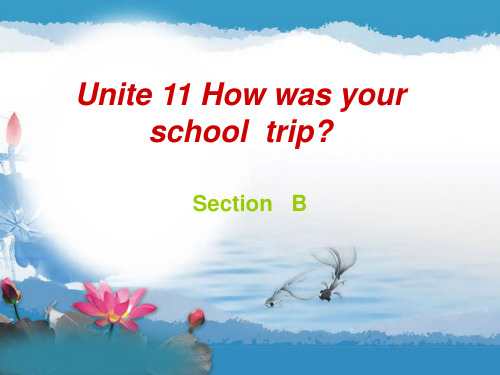
2c Complete the chart. How do Helen and
Jim describe these things?
Helen the trip the train Jim
1c Listen again. What did Jane and Tony
do on their last school trip? Check (√) Tony or Jane.
went to the countryside climbed went to saw some drew a an art paintings pictures mountain museum
watch flowers
watched flowers
pick strawberries picked strawberries
1a Match the activities with the pictures 1.go to the zoo __ 4. climb a mountain__ 2.visit a museum__ 5. visit a fire station__ 3.ride a horse__ 6.go fishing__
e
a
d
b
f
c
1a Match the activities with the pictures 1.go to the zoo _a_ 4. climb a mountain_e_ 2.visit a museum_c_ 5. visit a fire station_d_ 3.ride a horse_b_ 6.go fishing_f_
II. 译出下列短语 去散步 去购物 去钓鱼 挤奶牛 骑马 骑自行车 喂小鸡 和某人谈话 拍照
人教版英语七下课件Unit_11_How__was_your_school_trip_?_Section__B
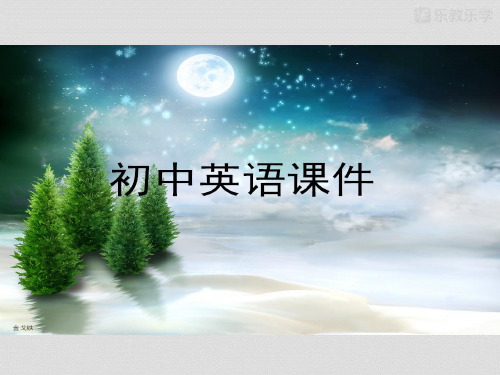
a
d
b
f
c
写出下列动词的过去式。
不规则动词
go went ride rode
do did
is
was
are were
have had
eat ate
buy bought
see saw
规则动词
pick picked visit visited
watch watched
climb climbed
study studied
否定句:句中有were或was在构成否定句时, 在was或were后面加not
Youweren’tatschoolyesterday.(否定句)
疑问句:构成疑问句时,把were或was放在主 语前面,句尾加问号;肯定回答和否定回答 时态要与问句中的时态一致
---Wereyouatschoolyesterday?(一般疑问句) ---Yes,Iwas. ---No,Iwasn’t.
Whatdoyoudoe Whatdidyoudola
veryday?
stweekend?
feedchickens
fedchickens
milkacow
milkedacow
rideahorse
rodeahorse
Whatdoeshe/shedoWhatdidhe/shed
everyday?
oyesterday?
写出下列动词的过去式:
• go—hwaevne/thas—see— had • eat—bautye—take—bought ride—fereodd—ebring--- fed • is/am-awrea-s--come-w--ere buy---cubto--u-dgoh/tdoes---cut
新教材7下unit11How_was_your_school_trip单元归纳AllUPK
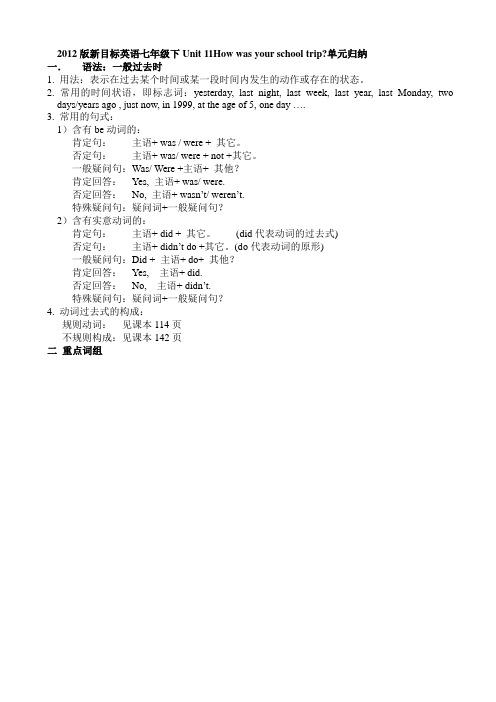
2012版新目标英语七年级下Unit 11How was your school trip?单元归纳一.语法:一般过去时1. 用法:表示在过去某个时间或某一段时间内发生的动作或存在的状态。
2. 常用的时间状语,即标志词:yesterday, last night, last week, last year, last Monday, two days/years ago , just now, in 1999, at the age of 5, one day ….3. 常用的句式:1)含有be动词的:肯定句:主语+ was / were + 其它。
否定句:主语+ was/ were + not +其它。
一般疑问句:Was/ Were +主语+ 其他?肯定回答:Yes, 主语+ was/ were.否定回答:No, 主语+ wasn’t/ weren’t.特殊疑问句:疑问词+一般疑问句?2)含有实意动词的:肯定句:主语+ did + 其它。
(did代表动词的过去式)否定句:主语+ didn’t do +其它。
(do代表动词的原形)一般疑问句:Did + 主语+ do+ 其他?肯定回答:Yes, 主语+ did.否定回答:No, 主语+ didn’t.特殊疑问句:疑问词+一般疑问句?4. 动词过去式的构成:规则动词:见课本114页不规则构成:见课本142页二重点词组1.school trip 学校旅行53.luckly you你真幸运。
2.go for a walk 去散步k a cow 给奶牛挤奶4.ride a horse 骑马5.feed chickens 喂鸡6.talk with the farmer和农民交谈7.take photos /a photo拍照8.quite a lot许多9.ask some questions问一些问题10.grow apples种苹果11.show sb. around sp.带某人参观某地12.learn a lot 学到很多13.grow strawberries种植草莓14.from...to... 从…到…15.pick some strawberries摘草莓16.take sth home带…回家st week上周18.visit my grangparents看望我的祖父母19.go fishing 去钓鱼20.so much 如此多的21.so clean 那么干净22.watch the stars 看星星23.go to the zoo去动物园24.go to a farm去农场st year去年26.a lot of fun很多乐趣27.so much fun这么多的乐趣28.climb the mountains 爬山29.a lot of flowers 许多花儿30.eat lunch 吃午饭31.play games 做游戏e out 出来33.visit a museum 参观博物馆34.visit a fire station参观消防站35.go to the countryside去乡下36.go on a school trip参加学校旅行37.science museum科学博物馆38.by train 坐火车39.along the way沿途40.play chess with sb... 和…下棋41.how to do sth 如何做某事42.make a model robot做一个机器人模型43.the gift shop礼品店44.buy sth for sb为某人买…45.all in all总的来说46.take the train to... 坐火车去…47.on the slow train在缓慢的火车上48.be interested in…对…感兴趣49.not...at all 一点也不,根本不50.at the zoo=in the zoo在动物园51.this summer今年夏天52. have a nice weekend有个愉快的周末三.词汇辨析中常用something 。
七年级英语下册Unit 11 How was your school trip SectionA Period 1(1a-2c)

1. ____ Did he see any cows on the farm? Yes, he did. 2. Did he milk a cow on the farm? No, he ______. didn’t 3. Were the strawberries good? Yes, they were 4. Did you see any cows? Yes, I did. I saw ___ quite a lot. 5. I ___ fed the chickens last week.
1a Match the phrases with the pictures. went for a walk e milked a cow b rode a horse a fed chickens c talked with a farmer f took some photos d
1b Listen and circle the three things Carol did on her school trip in 1a.
Learning aims:
• learn new words & phrases: • new sentences: (1)--- How was your school trip? --- It was great. (2)学会用 Did you ...? Yes,I did./ No,I didn't. 描述过去的事情。 Practice listening & speaking skills.
went for a walk milked a cow rode a horse fed chickens talked with a farmer took some photos
Unit_11_How_was_your_school_trip_Section_B_1a-2c

1a Match the activities with the pictures.
1. go to the zoo __ 2. visit a museum __ a c 3. ride a horse __ 4. climb a mountain __ b e 5. visit a fire station __ 6. go fishing __ d f
1c Listen again. What did Jane and Tony do on their last school trip? Check√ Tony or Jane.
went to climbed went to saw drew some pictures the a an art countryside mountain museum paint ings Tony Jane
选择填空 B 1. ____ Emily at her aunt’s last night? A. Is B. Was C. Did C 2. _____ he sleep late last night? A. Is B. Was C. Did 3. My mother _______ some cakes for us C last night. A. makes B. make C. made 4. — Did they take any photos? — _______. A A. No, they didn’t B. No, they did C. No, they aren’t
7. watch________ watched
I. 用适当的词填空
1. How was your school trip? It was great. ___ 2. How _____ you yesterday? were 3. Today is Monday. Yesterday ___ was Sunday. 4. What did you do the day before ___ yesterday? 5. ____ you ride a horse last week? Did
初中英语人教版七年级下册《Unit 11 How was your school trip Sect

They weclohreveea_l_py_.___ and
terrJibimle's&idbeoaring
The train was _s_lo__w___. He's not _in_t_e__re__sted in robots.
New words
dark
dark作形容词,意为“黑暗的”,反义词为 bright,意为“光明的” 天快黑了。 It' s getting dark. [拓展]①dark作形容词,还可意为“(色彩)深 的”;反义词为 light,意为“(色彩)浅的” 我爱好深蓝色。 I like dark blue. ②dark作名词,意为“黑暗;暗处” 她在黑暗中什么也看不见。 She could see nothing in the dark.
Warm-up
S1. WhMS2. WhEenacdhidstyuoduegnot tahdedres?a sentence.
S3. How was the weather there?
S4. WhSohdaidreyyoouugroswtoitrhy.?
New words
fast
fast作副词,意为“快地” 反义词为slowly“慢地 这个男孩跑得快。 The boy runs fast. fast用作形容词,意为“快的” 反义词为slow“慢的 我们可以乘快车。 We can take a fast train.
New words
guide
guide可数名词,意为“导游;向导” 导游带我们参观了博物馆。 The guide showed us around the museum. [拓展] guide及物动词,意为“带领;引导” 她领着她的学生过马路。 She guided her students across the road.
Unit_11_How_was_your_school_trip_Section_B_3a--self_check

home, but tomorrow he is ______ (take) a taking
bus there.
按照要求完成句子, 每空一词。
1. Peter did his homework last night. (改为否 定句) didn’t do Peter ______ ______ his homework last night. 2. There were some children in the park just now.(变一般疑问句,并进行否定回答) Were any —_____ there ______ children in the park just now? there _______. —No, ______ weren’t
Unit 11 How was your school trip?
Section B
Period 2 (3a-Self Check)
翻译下列短语和句子。 1. 到达那儿 get there 2. 下棋 play chess play the piano play basketball
弹钢琴
打篮球
3. 对感兴趣 be interested in all in all 4. 总之
1 Write more verbs and their past forms in each group. climbclimbed
pick-picked milk-milked play-played stay-stayed want-wanted
arrivearrived
hope-hoped live-lived movemoved dancedanced
七年级英语下册 Unit 11 How was your school trip Section B
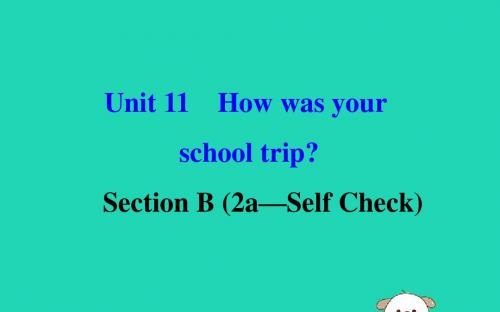
【句型剖析】 本句型是由两个并列分句构成的பைடு நூலகம்列句, and是并
列连词, 表示并列关系。and还可用来连接单词、短语, 表示并列、顺承。
【拓展延伸】 并列连词but意为“但是;然而”, 表示转折关系,
所连接的成分意思相反或相对。 I also went to the gift shop with my classmates, but I didn’t buy anything. 我还和同学去了礼品店, 但我没买任何东西。
4. I learned a lot about _r_o_b_o_ts_(机器人). 5. I went to the gift shop and bought some _lo_v_e_l_y(可爱 的)gifts for my parents.
Ⅱ. 根据汉语提示完成下列教材中的句子 1. 今天我参加学校郊游了。 Today I _w__en__t _o_n_ a school trip. 2. 然后导游教我们如何制作机器人模型。 Then the guide taught us _h_o_w_ _to_ _m_a_k_e_ a model robot. 3. 我们坐火车去的博物馆。 We _to_o_k_ the train _to_ the museum.
4. 房间真的很暗, 拍照很难。 The rooms were _re_a_l_ly_ dark and _it_ was difficult _to_ take photos. 5. 我一点儿也不喜欢这次旅行。 I _d_i_d_n_’t_like the trip _a_t _a_l_l .
考点1 exciting adj. 使人兴奋的;令人激动的 *All in all, it was an exciting day. 总的来说, 是令人兴奋的一天。(教材·P65) *Bob is excited about the news. 鲍勃听到这个消息很兴奋。
2012新版unit11how_was_your_school_trip - 副本

took some photos
A: Did you take any photos yesterday? B:Yes, I did.
Dear Bill , was How _____( is ) your school trip yesterday ? go Did _____(Do) you ____(go) to the zoo ? Did take ____you ____( take ) any photos ? Did see ____(Do)____ ( see) any interesting went animals ? I ____ ( go ) to the zoo last year was and it ____( is ) a lot fun .
• 3. --你昨天去钓鱼了没? --去了。 --Did you go fishing yesterday? -- Yes, I did. • 4. --昨天那里的天气好吗? -- 小雨。 --Was the weather good there yesterday? -- It was rainy.
Before(以前)
— How was the weather yesterday? — It was cloudy.
is — was
Unit11 How was your school trip ? (你的学校旅行怎么样?)
A: What did you eat in this morning?
• • • • • • • • • • •
played visited climbed studied worried stopped was were had ate bought
Regular Words ( 规则动词 )
- 1、下载文档前请自行甄别文档内容的完整性,平台不提供额外的编辑、内容补充、找答案等附加服务。
- 2、"仅部分预览"的文档,不可在线预览部分如存在完整性等问题,可反馈申请退款(可完整预览的文档不适用该条件!)。
- 3、如文档侵犯您的权益,请联系客服反馈,我们会尽快为您处理(人工客服工作时间:9:00-18:30)。
2aDo the following words describe good things or bad things? Put a √ for good and an X for bad. Leave a blank if they can mean both.
___ interesting
_X__ difficult
slow adj. 缓慢的;迟缓的
fast adv.&adj. 快地(的)
robot n. 机器人
七下
5
unit11how_was_your_school_trip_
Words review
guide n. 导游;向导
gift n. 礼物;赠品
all in all 总的说来
everything pron. 所有事物;一切
一般疑问句:Was she in Beijing last year?
否定句:She wasn’t in Beijing last year
2、She lives in Beijing
过去时:She lived in Beijing in 2000
一般疑问句:Did she live in Beijing in2000?
interested adj. 感兴趣的
be interested in 对……感兴趣
dark adj. 黑暗的;昏暗的
hear v. (heard) 听到;听见
七下
6
unit11how_was_your_school_trip_
science museum
七下
7
unit11how_was_your_school_trip_
否定句:She didn’t live in Beijing in2000
七下
4
unit11how_was_your_school_trip_
Words review
exciting adj. 使人兴奋的;令人激动的
lovely adj. 可爱的
expensive adj. 昂贵的
cheap adj. 廉价的;便宜的
6.Did Jim take any photos? Why?
7.Did Jim hear the guide? Why?
七下
10
unit11how_was_your_school_trip_
1、 Did Helen and Jim go on the same trip?
Yes, they did. They went on the same trip.
He taught her to make a model robot
七下
11
unit11how_was_your_school_trip_
5、Was Jim interested in robots? No,he wasn’t
6、Did Jim take any photos? Why?
No, he didn’t. Because the rooms were really dark and it was difficult to take photos.
___ lovely __X_ slow ___ exciting
_X__ boring ___ cool ___ hot
___ lucky ___ large _X__ expensive
_X__ terrible
___ delicious
___ great ___ cheap ___ fast
七下
①一般情况在词尾加ed②以e结尾的直接加d③重度闭音节的词双写最后一 个字母再加ed④以辅音字母加y结尾的去y变i加ed⑤不规则的变化142页表
3、一般现在时如何变过去时
①系动词的把系动词变成was或were ②没有系动词的把动词变成过去式
4、一般过去时如何变一般疑问句:
①有系动词的把was或were提到句首其余照抄加问号②没有系动词的在句首加did, 动词变原形,其余照抄句尾加问号
7. Did Jim hear the guide? Why?
No, he didn’t. Because there were too
many people there .
1
学习目标
• 1.以日记的格式,用一般过去时记录一天的 活动并表达感想。
• 2.提高用英语描述过去事件的能力。 • 3.培养学生与人合作、互帮互学的团队精神。
七下
2
unit11how_was_your_school_trip_
复习一般过去时态
1、动词过去式的构成:
5、如何变否定句:
①有系动词的在was或were后加not,能缩写的缩写②没系动词的在动词前加
didn’t,动词变原形其余照抄
七下
3
unit11how_was_your_school_trip_
把下面两句话变成过去时,并变一般疑问句
和否定句
1、She is in Beijing
过去式:She was in Beijing last year
8
unit11how_was_your_school_trip_
2 b
Fast Reading
七下
9
unit11how_was_your_school_trip_
2b Read Helen’s and Jim’s diary entries and answer the questions.
1 Did Helen and Jim go on the same trip? 2.How do they feel about the trip? 3、How did Helen go there ? 4、What did the guide teach Helen to do? 5、Was Jim interested in robots?
2.、How do they feel about the trip?
Helen thought the trip was really interesting. But Jim thought the trip was terrible.
3、How did Helen go there ?
She went there so fast by train 4、What did the guide teach Helen to do?
